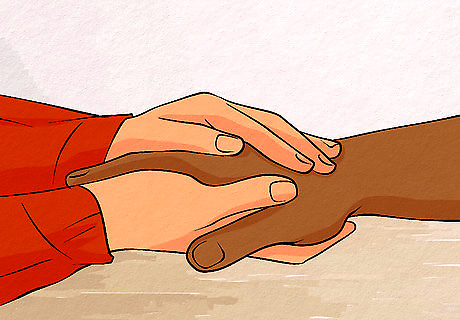
views
Handling Conflict

Talk to him after he’s calmed down. In order to save yourself any extra stress, wait for the right time to have a mature discussion. If your boyfriend is mean because he’s tired, frustrated, or upset, then he’ll probably avoid talking about any important issues. Ask him if you can return to the conversation when you’ve both had a chance to calm down. If you let the matter rest for a few days, he may be level-headed again. Let him find ways to control his emotions. For example, he might need to go for a run or have some space to himself so he can think. Focus on your inner peace, too. You might ground and center yourself, meditate, or journal. Use a calm tone of voice when you check in: “Hey, is now a good time to talk? No pressure.”

Reflect on any stressful situations he’s faced lately. At the moment, he may not want—or even know how— to express himself. As you both take some space, think about your partner’s “triggers” (situations that upset him). Look for any cues that he’s not ready to open up and is instead likely to be negative. While you shouldn’t have to feel like you’re walking on eggshells, noticing his behavior can help you avoid confrontations altogether. Examples of Triggers: Work-related stress, like deadlines or tensions with his boss. Family-related stress, like sick parents or arguments with his relatives. Money-related stress, like being behind on bills or taking out a loan. Intimacy-related stress, like feeling insecure about his body or performance. Ego-related stress, like lacking confidence or believing he's not "man" enough. Examples of Cues: An angry expression on his face. Remaining silent for long periods of time. Balling up his fists or looking tense. Struggling to get enough rest. Speaking in an agitated tone of voice. Isolating himself in his room. Avoiding answering texts.

Ask him directly why he’s so angry. While you can make educated guesses as his partner, you'll only know the whole story if he shares what's bothering him. If he says he's ready to talk, then open the discussion with clear and simple questions. At this time, give him a chance to tell you exactly what's upset him, which provides you an opportunity to learn the root cause of his behavior: "Thank you for agreeing to talk. So, why have you been so upset?" "I just want to hear you out. What, specifically, are you angry about?" "Let's get to the bottom of this. Has anything been bothering you lately?"

Talk about ways he can cope with his triggers. If it turns out that he's bothered by a situation that's completely unrelated to your relationship, discuss strategies that can cut back on his stress. While he's ultimately responsible for developing his resilience, coming up with an action plan can help him find peace and prevent flare-ups of anger. First, ask if he wants you to think about a solution or if he just wants to vent and figure it out on his own—"Okay, now I understand that you're stressed by balancing a full-time job and night classes. Would you appreciate some advice or would you rather manage your schedule by yourself?" If he's open to feedback, provide an actionable step that you believe can cut back his stress—"We'll actually be just fine if you switch to part-time hours so you can focus on your coursework. Or, you can still drop a couple classes right now and go through one more semester to finish your program."

Express compassion if he's frustrated by your relationship. It's very disappointing when your partner lashes out about your love life. However, if you acknowledge his anger, it can be like pouring cold water over fire. Just a simple remark like, “I understand you’re upset,” can make a world of difference. If he opens up, actively listen to him. To prove you see where he’s coming from and to communicate effectively, repeat back what you hear. Be as specific as possible. For example, instead of saying, “That makes sense,” tell him, “I understand that you’re frustrated because I didn’t call you back when I was out with my friends.” Remember, this is only one stage of the conversation. While it's important to hear your boyfriend out, you are equally deserving of being listened to. Later, when it's your time to open up about your perspective, make sure your partner validates your experiences and emotions as well.

Ask how you can resolve the problem. Your boyfriend’s mean words and actions might stem from a sense that he’s been wronged or treated unfairly. Encourage your boyfriend to express what he needs from you right now. Reassure him that you want to be proactive and find a way to address his frustrations or concerns. Bring up the topic with a question like, “What would make you feel respected?” or “What seems fair to you?” A healthy relationship requires balance, so track how often both of you manage conflicts. If you're the only one who makes an effort to demonstrate respect and ask about compromises, then it's a sign you have an uneven dynamic. Your boyfriend should also ask similar questions. For example, he should make comments like, "Are you okay with the way I communicate?" or "Do you feel like I'm being fair?"

Agree to his request if it seems reasonable. If your boyfriend clearly states what he wants from you, carefully consider it and determine whether you can honor what he needs. Let him know your decision. Ideally, you’ll both come to an agreement. In that case, your willingness to help might immediately reduce his anger and allow you both to move forward in a productive manner. Sometimes, he might just want you to apologize. Only accept these terms if you genuinely feel sorry. For example, say, “I apologize that I didn’t call you before 10 P.M. like I said I would. Following through is important to me.” Other times, he might expect a certain action or favor. Reassure him that you’ll provide that if you think it’s fair. You might say—“I’m happy to spend my Saturday evenings with you so you can get some quality time.” Advocate for yourself and express when a request isn't reasonable. For instance, he might want you to skip work or school to spend time with him. In that case, say, “I really need to focus on my responsibilities. My future is important to me.”
Setting Boundaries

Define your limits. Be as straightforward as possible when you set your boundaries. If he's acting in a way that you find unacceptable, let him know that. Even if he isn’t aware of what he’s doing, such as raising his voice, be direct and point out ways he’s being inappropriate. Tell him he’ll have to immediately stop these behaviors if you’re going to talk to him. “Don’t stand in front of the door. I’m allowed to leave at any moment.” “Put down that book. It’s not okay to throw things in our house.” “Please lower your voice. We need to have a civil discussion.” “I’m not going to give you my passwords. That’s an invasion of privacy.”

Don’t allow insults or name calling. Remember that there is absolutely no excuse for degrading language. Whenever your partner uses put-downs, he is engaging in control tactics and humiliation, neither of which are part of a healthy relationship. If your boyfriend uses any offensive term, stop what you’re doing, look him in the eyes, and say, “Don’t ever call me that again.” If your boyfriend belittles your appearance, intelligence or choices, it’s considered emotional abuse and he needs to learn to stop this behavior. Insults can sting in the moment, and they can also damage your self-esteem, which may make you feel more dependent on your boyfriend. Never blame yourself for your boyfriend’s mean words, and avoid accepting any cruel remarks. Instead, make sure to focus on building your self-worth.

Ban the use of curse words. Since cursing during an argument will only increase tensions and escalate matters, make sure it’s off limits while you two try to resolve everything. If your boyfriend slips up, use “I” statements to remind him that his language isn’t acceptable and that he’ll need to express himself in a more calm and collected way. For example, say something like, “I understand that you’re upset about me not calling you back, but that kind of language isn’t helping either of us. Remember, we agreed to talk about this without using those words.” If you want, you can give him a chance to recollect himself. You might say, "Do you want to stop for a few seconds and say that in a different way?"

Prohibit the use of yelling. Whenever partners yell at each other, it can make you both angry, scared, or defensive. Tell your boyfriend that you’ll both need to communicate with a normal volume and a calm tone. If he’s prone to anger and doesn’t realize that he’s yelling, use “I” statements to define your boundaries. Remind your partner that he needs to adjust the way he talks to you. For example, try saying, “I won't allow you to yell at me. I feel anxious when you yell, and when that happens, I can’t concentrate on this topic. Either you stop shouting, or I'll talk to you later when we’ve both had a chance to calm down."

Don’t allow blaming. Point out that blaming is ineffective because it distracts you both from actually resolving your issue. If he continues to focus on how “bad” or “wrong” you are, stand up for yourself and tell your boyfriend that you won’t accept all the responsibility for any conflict in your dynamic. Use “I” statements to express your perspective. State how you feel when he continues to blame you—“I feel very upset and hurt when you blame me for all of our problems.” Then, remind him of your agreement—“We promised not to blame each other. Remember, our main goal here is to find a way to get through this.”

Be ready to leave if you feel unsafe. If you're afraid of your boyfriend most of the time, it's a sign that you shouldn't live with him or even date him. If your boyfriend intimidates you, threatens you, or is violent toward you, then that qualifies as domestic abuse and you should remove yourself from the situation. When you have privacy, call a friend or a domestic violence hotline for support. Save money in case there's an emergency and you need somewhere to stay. Make sure you have transportation so you can leave when you need to. Keep details about your plan private so your boyfriend isn't able to find you. Avoid going back to your partner, even if he pleads or says he'll change. Call 911 or your local emergency number if you're in immediate danger.
Managing Your Emotions

Use positive reframing to cope with your frustration. “Positive reframing” helps you get rid of negative thoughts by looking at a situation with a different view. Practice positive reframing when your boyfriend is angry so you can avoid feeling shame or negativity. For example, instead of telling yourself, “All I do is irritate him,” say, “He must be having a bad day.” It’s not always easy to feel empathy for a person who’s being mean. However, by choosing to reframe his anger, you keep yourself from becoming defensive. Try using phrases like “He’s doing the best he can,” or “This is just the way he copes." This way, you resist feeling as though you’re responsible for his mood. Just because you reframe his anger doesn't mean that you have to accept it. Positive reframing is a tool to remind yourself that you’re not the one at fault.

Accept that you can’t “fix” your boyfriend. Have some grace for yourself and acknowledge that you aren’t capable of making your partner change—only he can do that. While his words might leave you feeling angry, frustrated, afraid, or even powerless, allow yourself to let go. Have an inner dialogue with yourself and remind yourself that there’s a limit to how much you can help him. For example, if you feel guilty because you told your boyfriend you can’t drop everything for him, tell yourself, “I wish I could have helped, and I know he will continue to be angry, but I need to take care of myself.”

Maintain your inner peace. When your boyfriend is constantly on edge, there’s a risk that you might internalize his attitude and even become angry yourself. If you notice any signs that you feel more prone to criticism or sarcasm, take deep breaths and work on self-care. Focus on returning to a state of balance so you can work through any frustrations you have. It may help to list your boyfriend’s triggers—situations that upset him—to avoid stress. You might write down something like, “He doesn’t like when I talk to him when he’s working, so I’ll make sure to avoid that. It’ll keep the peace.”

Tell him how you feel. When you’re more emotionally vulnerable, you not only express your emotions, but you also increase intimacy in your relationship. While it’s important to address your boyfriend’s needs and concerns, you deserve to be taken care of, too. Use “I” statements to let him know how you’ve been impacted and to share the type of healthy dynamic you want. Share the strain some of his behaviors put on you—"I feel hurt when you come home from work and immediately get frustrated with me. I want our home to feel like a safe and calm environment, and lately I don't feel relaxed." Express your ideals for a nourishing relationship—"My goal is for us to both communicate about what could keep our stress levels down and to enjoy each other's company. I want us to thrive and be happy."

Consider a therapist if the situation remains unresolved. If you and your boyfriend continue to face conflicts, it may help to consult a professional. A counselor who specializes in relationships might deescalate issues. They can address both your needs, share ways to cope with frustrations, and improve your level of communication. A therapist acts a trained third party, so they can discuss both of your perspectives without taking sides. A counselor can help you both identify your attachment styles to see how you might experience anxiety or insecurities in a relationship. Even if your boyfriend doesn't agree to go to therapy, you might wish to go by yourself to receive extra support and process your emotions.


















Comments
0 comment